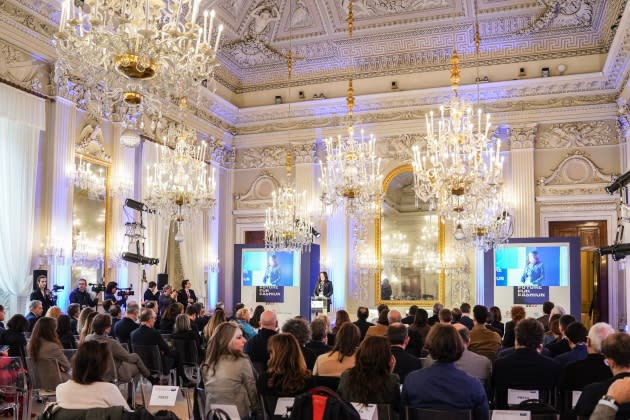Gruppo Florence, Kiton Eyeing IPOs
- Oops!Something went wrong.Please try again later.

FLORENCE — Just as Prada is said to be mulling a double listing in Milan, there was much talk of potential IPOs under the stuccoed vaults of Palazzo Pitti’s Sala Bianca on Thursday, the first of the two-day Future for Fashion conference.
Attila Kiss, chief executive officer of Italian fashion manufacturer Gruppo Florence, revealed that the company’s “destiny” is an initial public offering. Speculation has recently been circulating that private equity fund Permira was eyeing an investment in Gruppo Florence.
More from WWD
Gruppo Florence is controlled by private equity fund VAM Investments, Fondo Italiano d’Investimento and Italmobiliare and has sales in the region of 600 million euros, said Kiss.
Gruppo Florence was established in October 2021 with the goal of developing a platform to supply high-quality Made in Italy products to major luxury fashion brands, leveraging competitive prices, guaranteeing prompt and flexible deliveries and solutions, while safeguarding the technical and cultural know-how of small and medium-sized family-owned Italian companies.
Since then, it has grown to own controlling stakes in around 20 companies, ranging from Metaphor, which produces high-end knitwear; informal outerwear manufacturers Emmegi and Giuntini, and Ciemmeci, a company that specializes in the production of leather and fur pieces, to Confezioni Elledue, a specialist in casual outerwear based in Tuscany, and footwear specialists Lorenza Calzaturificio and Novarese.
As is customary for Gruppo Florence, which Kiss said has reached sales of 600 million euros, the founding families and controlling shareholders have agreed to maintain minority ownership of the companies they run.
Former Bulgari and LVMH Moët Hennessy Louis Vuitton executive Francesco Trapani is chairman of Gruppo Florence and of VAM Investments.
Kiton CEO Antonio De Matteis, known as Totò, also said the family-owned menswear company, which has been expanding into womenswear, is interested in the Bourse. An IPO would enable it to “leave a structured and organized company to the third generation, with precise rules. However, we are not in a rush.”
De Matteis explained that at Kiton, which is based in Arzano, 5 miles from Naples, there are five cousins from the second generation with roles in the company, but there is a third generation coming up, 10 family members aged 10 to 30.
In February, De Matteis was elected president of Pitti Immagine, which operates leading menswear trade fair Pitti Uomo, in addition to Pitti Filati, Pitti Bimbo and Pitti Fragranze dedicated to yarnmakers, childrenswear and fragrances, respectively, as well as Taste centered on food, Testo on books, and Super on contemporary fashion. He succeeded Claudio Marenzi, president and CEO of Herno.
“In my life, I’ve done 80 editions of Pitti Uomo. I’ve always believed in it and it coexists with Milan,” he said.
He touted the importance of the collaboration between Pitti Uomo and Italy’s Camera Della Moda, exemplified by Fendi’s decision to stage its men’s spring 2024 show at its Capannuccia factory, a 30-minute drive from Florence, on June 15, during Pitti Uomo, which is scheduled to run June 13 to 16.
Asked about potential changes he envisioned for Pitti Uomo, he said, “We can discuss the dates, pre-collections have become main collections,” without elaborating.
Social sustainability was also a key topic at Future for Fashion, which is promoted by the city of Florence, Centro di Firenze per la Moda Italiana, and Confindustria Firenze.
De Matteis underscored that Kiton’s employees and artisans are among the highest paid in the industry and that his uncle Ciro Paone, founder of the company, taught him that respecting the workers was paramount. He elicited a round of chuckles by saying that Paone in 1991 set up shifts in the company’s canteen, so that 150 employees per shift “would eat spaghetti cooked al dente [firm].”
He revealed that Kiton last year gave a bonus of 2,000 euros to each employee, but that, after taxes, they received 1,200 euros. “This is something I will bring up tomorrow with [Minister of Enterprises and Made in Italy Adolfo] Urso. It’s not right.”
These are subjects dear to Brunello Cucinelli, who has been voicing his belief in the moral and economic dignity of work for years. He reiterated his concerns about protecting the artisans and the supply chain. “Today, it’s not difficult to sell; the problem is, who will produce in the future?”
Cucinelli said he has raised the salary of his artisans by 20 percent, but said the lack of interest in approaching this kind of job is “a cultural issue,” more than a financial issue. “Young people often find it shameful to say they are [blue-collar] workers,” he said.
Also, he expressed his pride in keeping the company based in Italy and paying taxes here. “This is a way to help the country grow.”
During the conference, Massimiliano Giornetti, director of Polimoda, and Linda Loppa, adviser strategy and vision at the school, presented Anarchive, a new research center in Florence for students, designers, curators and companies interested in fashion studies. “Archive in itself is a closed space, but this will be open, dynamic and accessible, also a place for meetings and appointments,” said Giornetti.
The goal is also to create a digital fashion archive, and it will host one of the biggest fashion libraries in Europe with an international collection of more than 25,000 volumes and more than 600 magazines and catalogues.
Best of WWD
